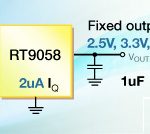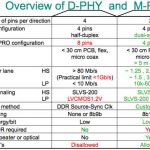With all the focus in design on SoCs in the latest sexy process (Hi-K Metal Gate! FinFETs!) it is easy to forget all the other chips that go into a system. When we say “system on a chip” there are actually very few systems that really get everything onto a single chip. One of the big areas that usually cannot go on the latest… Read More
Tag: synopsys
Interface PHY IP supporting Mobile Application on TSMC 20nm? Available!
If we check the many articles daily published in Semiwiki, I am sure that Moore’s Law has been mentioned every single day. There is a good reason why we constantly write about new technologies and advanced features like FinFet, FD-SOI, 450 mm wafers or double patterning: all of these are new challenges that the SC industry will have… Read More
How to Design an LTE Modem
Designing an LTE modem is an interesting case study in architectural and system level design because it is pretty much on the limit of what is possible in a current process node such as 28nm. I talked to Johannes Stahl of Synopsys about how you would accomplish this with the Synopsys suite of system level tools. He is the first to admit… Read More
Test Compression and Hierarchy at ITC
The International Test Conference (ITC) is this week in Anaheim and I’ve just learned what’s new at Synopsys with test compression and hierarchy. Last week I spoke with Robert Ruiz and Sandeep Kaushik of Synopsys by phone to get the latest scoop. There are two big product announcements today that cover:… Read More
Mobile SoC will benefit now from M-PCIe
We have already discussed the recently released M-PCIe ECN from PCI-SIG in Semiwiki at the end of 2012, but the new “standard” (in fact an Engineering Change from PCI-SIG and MIPI Alliance) was only real on paper, at that time. The upcoming webinar from Synopsys, M-PCIe: Utilizing Low-Power PCI Express in Mobile Designs, shows … Read More
LSI’s Experience With Formality Ultra
LSI is an early adopter of Formality Ultra, Synopsys’s tool for improving the entire ECO flow. I already wrote about the basic capability of the tool here. ECOs are changes that come very late in the design cycle, after place and route has already been “nearly” completed. They occur either due to last minute spec… Read More
More to the story than bigger FPGA-based prototyping
Still not convinced on the value of FPGA-based prototyping systems, or using older technology? I’ve been trying to find the story beyond just bigger, badder FPGAs in a box that you pour RTL into – and found some hints in a webinar on the Synopsys HAPS-70 from earlier this year.… Read More
Why Adopt Hierarchical Test for SoC Designs
IC designers have been creating with hierarchy for years to better manage large design sizes, however for the test world the concept of hierarchy and emerging standards is a bit newer. TSMC and Synopsys jointly created a webinarthat addresses hierarchical test, so I’ve attended it this week and summarized my findings here.… Read More
Pre-verified, Integrated Sensor IP Subsystem?
Last year, I said that the launch of ARC based complete sound system IP by Synopsys ring the bell for the opening of a new IP market segment, the “Subsystem IP”. This week, Synopsys has announced the availability of the DesignWare® Sensor IP Subsystem, a complete and integrated hardware and software solution for sensor control applications.… Read More
Any MIPI CSI-3 Host IP Solution for SoCs Interfacing with Sensors?
For those taking a quick look at the various MIPI Interface specification, the first reaction is to realize that they will have to look at MIPI more closely, and that it will take them longer than expected to make sure they really understand the various specifications! Let’s start with the PHY. One specification defines the D-PHY,… Read More











